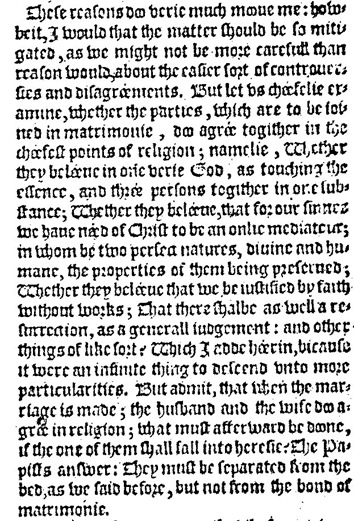Of all the questions that hit my inbox, the second most commonly asked involves romantic relationships between Catholics and Protestants—whether it’s wise for one to pursue marriage across the religious divide (the most common question pertains to conversion, either to or from Rome).
Some time ago, I wrote two posts on the topic, one on dating and another on marriage itself. Since then, a couple of readers asked me an interesting question for which I didn’t have an answer: “What would the Protestant Reformers have said about it?” I wasn’t sure, that is until I read a fascinating passage in Peter Martyr Vermigli’s (1499-1562) Loci Communes. Following is a copy of the sixteenth-century English version (translated from Peter Martyr’s Latin by Anthonie Marten, London: Henry Denham and Henry Middleton, 1583).
If you’re having difficulty reading Marten’s sixteenth-century translation, here is what it literally says:
“These reasons do very much move me, howbeit I would that the matter should be mitigated, as we might not be more careful than reason would about the easier sort of controversies and disagreements. But let us chiefly examine whether the parties which are to be joined in matrimony, do agree together in the chief points of religion, namely, whether they believe in one very (true) God, as touching the essence, and three persons together in one substance. Whether they believe that for our sins we have need of Christ to be an only mediator in whom be two perfect natures, divine and human, the properties of them being preserved; Whether they believe that we be unified by faith without works; that there shall be as well a resurrection, as a general judgment, and other things of like sort, which I adhere in (maintain) because it were an infinite thing to descend unto more particularities. But, admit that when the marriage is made, the husband and the wife do agree in religion, what must afterward be done.”
Notice how Peter Martyr sets up the issue: “Let us chiefly examine whether the parties which are to be joined in matrimony, do agree together in the chief points of religion.”
- Trinitarian Faith. “Whether they believe in one very (true) God, as touching the essence, and three persons together in one substance.”
- Need for Christ. “Whether they believe that for our sins we have need of Christ to be an only mediator in whom be two perfect natures, divine and human, the properties of them being preserved”
- Justification by Faith Alone. “Whether they believe that we be unified by faith without works”
- Future Hope. “That there shall be as well a resurrection, as a general judgment, and other things of like sort, which I adhere in (maintain) because it were an infinite thing to descend unto more particularities.”
It is interesting to consider these tenets in the light of what today we would identify as “evangelical distinctives.” On the whole, they are compatible notwithstanding the omission of the doctrine of Scripture alone (that the Bible is the supreme source of authority for Christian faith and practice), which Peter Martyr seems to assume. It is noteworthy that Vermigli’s criteria make no mention of the Eucharist, of which he had much to say. But it does specify a position on justification and on Christ as our only mediator.
Personally, I’d like to add a few other topics to the list, such as the papacy, the role of Mary and the saints, and the sacramental system. But Vermigli’s emphasis on Christ’s mediation and its appropriation by faith is the right starting point for conversation. It was the central issue then and still is now.






